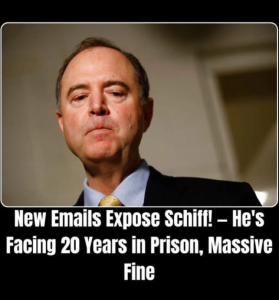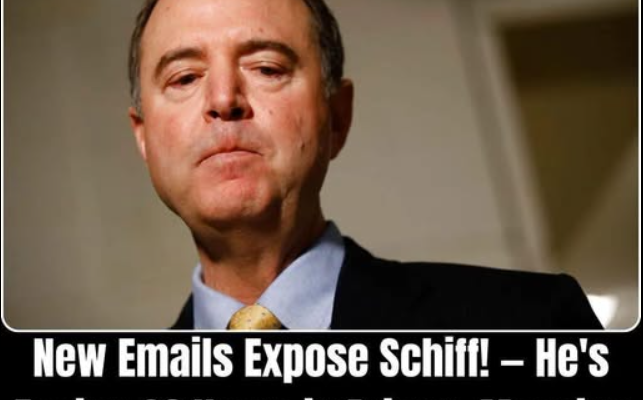Adam Schiff Faces Legal Risks as Whistleblower Alleges Classified Information Leaks
Adam Schiff, a high-profile Democratic congressman and former Chair of the United States House Permanent Select Committee on Intelligence (HPSCI), is once again at the center of political controversy. A newly surfaced whistleblower allegation claims that Schiff may have been involved in leaking sensitive or classified information to the media and external actors during his tenure on the committee. If proven true, the claims could expose Schiff to legal and political consequences—potentially altering his career trajectory and reshaping the political landscape in Washington.
A Whistleblower Steps Forward
According to reports circulating in Washington, a whistleblower—described as a former intelligence official with direct knowledge of committee operations—has submitted testimony and supporting documents to oversight bodies. This individual alleges that classified materials, including intelligence briefings and sensitive summaries, were improperly shared with unauthorized third parties.
The claims reportedly focus on several incidents during high-profile investigations into foreign election interference, surveillance programs, and national security issues. Specifically, the whistleblower claims Schiff either directly or indirectly facilitated these leaks, or failed to adequately safeguard classified information under his committee’s control.
Though the whistleblower’s identity remains confidential, their complaint has reportedly triggered a preliminary inquiry by relevant oversight agencies.
The Alleged Leaks
Leaks of classified information are taken extremely seriously in Washington, particularly when they involve intelligence or national security matters. According to the allegations, the leaks in question may have included portions of classified briefings that later appeared—often within hours or days—in major media outlets.
Some of the allegedly leaked details reportedly concerned intelligence community assessments related to foreign interference in U.S. elections, as well as sensitive methods and sources.
Such leaks, if confirmed, would not only violate federal law but could also endanger ongoing intelligence operations, compromise sources abroad, and undermine trust between the intelligence community and congressional oversight bodies.
Legal Framework and Potential Exposure
The unauthorized disclosure of classified information can fall under several criminal statutes. Most prominently, the Espionage Act and various federal statutes criminalize the sharing of sensitive national security information with individuals who do not have the proper clearance or “need to know.”
Although congressional members have unique protections under the Speech or Debate Clause of the U.S. Constitution, that protection does not grant blanket immunity from criminal investigation or prosecution in cases involving the intentional leak of classified information. If evidence demonstrates deliberate disclosure, Schiff could face legal exposure ranging from censure or expulsion from Congress to criminal charges, depending on the severity of the breach.
Political Firestorm and Reactions
The allegations have immediately sparked a political firestorm. Schiff has long been a polarizing figure in U.S. politics—particularly after his leading role in high-profile investigations during the Trump administration. Supporters view him as a staunch defender of democratic institutions and oversight of intelligence operations. Critics accuse him of being politically motivated and overly willing to use classified briefings for political gain.
Republican lawmakers have already seized on the whistleblower allegations, calling for formal investigations and hearings. Some have even floated the idea of stripping Schiff of his security clearances and committee assignments.
“This is a serious matter,” one senior Republican member of Congress stated in a press briefing. “If these allegations are substantiated, it represents a dangerous breach of trust between Congress and the intelligence community.”
Democrats, meanwhile, have called for caution, emphasizing that whistleblower claims must be thoroughly vetted before conclusions are drawn. “Every member of Congress deserves due process,” said a Democratic spokesperson. “We should not politicize whistleblower complaints before facts are established.”
Schiff’s Response
Schiff has strongly denied any wrongdoing. In a statement released by his office, he called the allegations “baseless” and “politically motivated.”
“I have always upheld the highest standards in handling classified information,” Schiff stated. “Any suggestion that I improperly disclosed or facilitated the leaking of intelligence is false. This is nothing more than a desperate attempt to weaponize unfounded claims.”
Schiff’s legal team has also indicated a willingness to cooperate with any legitimate inquiry, expressing confidence that no evidence of misconduct will be found.
Oversight and Investigations Ahead
The next steps are expected to involve preliminary reviews by congressional and possibly executive branch oversight entities. The United States Department of Justice (DOJ), the Office of Congressional Ethics (OCE), and intelligence community inspectors general could all play roles in assessing whether the allegations have merit.
If the preliminary inquiry uncovers evidence suggesting misconduct, formal investigations—including subpoenas, document reviews, and testimony—could follow. Such proceedings would be politically explosive, particularly given Schiff’s prominent role in past investigations involving classified material.
Broader Implications for Congressional Oversight
Beyond Schiff himself, this situation raises significant questions about how Congress handles classified information. Intelligence oversight relies on a delicate balance of trust between intelligence agencies and legislators. If leaks are perceived as politically motivated or improperly handled, agencies may be less willing to share sensitive information with congressional committees.
Some lawmakers are already pushing for stricter internal security protocols, including increased monitoring of who accesses classified material, stricter compartmentalization, and potential consequences for future violations.
“This isn’t just about one member,” one intelligence official noted anonymously. “This is about protecting national security. If oversight bodies can’t be trusted to secure information, that threatens the entire intelligence-sharing process.”
Media’s Role and Public Perception
The allegations also shine a light on the role of the media in handling classified information. Historically, major newspapers and media organizations have published classified material leaked by insiders, often under claims of public interest. While journalists are generally protected by the First Amendment, the sources of those leaks may face serious legal jeopardy.
Public perception will play a major role in how this story evolves. Schiff’s supporters are likely to see the allegations as politically motivated, while his opponents may view them as confirmation of long-standing suspicions. In such a politically charged environment, facts may be overshadowed by narratives.
What Comes Next
As the investigation unfolds, several outcomes are possible:
-
No Evidence Found — If oversight bodies find no credible evidence, Schiff could emerge politically strengthened, framing the allegations as a partisan attack.
-
Ethics Sanctions — If evidence of mishandling (but not criminal activity) is found, Schiff could face censure, loss of committee roles, or other congressional penalties.
-
Legal Consequences — If investigators uncover proof of intentional leaking of classified information, Schiff could face serious legal jeopardy, including referral to the DOJ.
-
Policy Reforms — Regardless of the outcome, the controversy may lead to tighter security protocols for congressional handling of classified materials.
Conclusion
The whistleblower allegations against Adam Schiff mark a dramatic escalation in Washington’s ongoing battles over secrecy, power, and politics. Whether these claims prove to be serious breaches of national security or politically motivated accusations remains to be seen. But one thing is clear: the stakes are high—not just for Schiff, but for how America safeguards its most sensitive intelligence information in a polarized political climate.

